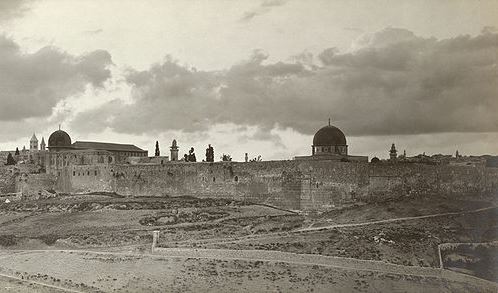Islam and the Birth of Christ
What do Muslims believe about the birth of Jesus, and how is it different from what Christians believe?
Many Evangelical Christians are surprised to discover that Islam believes in Jesus as the Virgin-born Messiah and Prophet. Indeed, it is interesting we have many professing Christian leaders who deny the supernatural birth of Jesus, but all orthodox and believing Muslims hold to it firmly. The starting point for any theological dialogue between Evangelicals and Muslims could be this common ground. However, there are important differences that must be recognised.

Jerusalem in the early 20th century.
Image: Wikimedia Commons
The chapters of the Qur’an are termed “Surahs” (meaning “fences”). Surah An-Anbiyaa 21:91 states: “And (remember) her who guarded her chastity: We breathed into her of Our Spirit and We made her and her son a Sign for all peoples”. Similarly in Surah Al-i-Imran 3:45ff we encounter terms that resemble the Lukan Annunciation narrative: “45 (And remember) when the angles said: O Mary! Allah giveth thee glad tidings of a word from Him, whose name is the Messiah, Jesus, son of Mary … 47 She said: My Lord! How can I have a child when no mortal hath touched me? He said: …Allah createth what He will …He saith unto it only: Be! and it is.” Similar expressions are made in Surah Maryam 19:20.
Although there is this common ground, notice that Islam attaches no theological significance to the Virgin birth; Surah 3:59 states: “Lo! the likeness of Jesus with Allah is as the likeness of Adam. He created him of dust, then He said unto him: Be! and he is.” Muslims often state that Adam’s creation was a greater miracle, since he had no parents at all! Moreover, there does not seem to be any compelling reason for the virgin birth in the Qur’an, since Islam denies original sin; the miracle is merely an arbitrary act of God’s will, an expression of His power. However, one interesting point in the Hadith, the narrations of Muhammad (the second source of authority for Muslims), indicates the uniqueness of Christ’s birth: Narrated by Abu Huraira: The Prophet said, “When any human being is born, Satan touches him at both sides of the body with his two fingers, except Jesus, the son of Mary, whom Satan tried to touch but failed, for he touched the placenta-cover instead.” (Sahih Al-Bukhari Hadith 4.506)
The meaning of “spirit” in Surah 21:91 is uncertain. It can mean God Himself, although the title “Holy Spirit” usually refers to the Angel Gabriel. The birth of Jesus is accompanied by Mary’s retirement to a remote place under a palm-tree (Surah Maryam 19:23) not a journey to Bethlehem. The figure of Joseph does not occur. Many Muslims attempt to quote the medieval forgery the Gospel of Barnabas to persuade Christians that it is the true Gospel. One of its many failings is that it reproduces contemporary Catholic superstition about Mary that she experienced no pains in child-birth: “The virgin …brought forth her son without pain …” In contrast, Surah Maryam asserts that Mary did experience pain: “And the pangs of childbirth drove her unto the trunk of the palm tree.” The canonical gospels are silent on the issue, but we may presume that the actual delivery was normal.
The Biblical infancy narratives are not reproduced in the Qur’an; instead we have the wunderkind of apocryphal gospels, with Jesus speaking in the cradle (Surah Maryam 19:19ff, cf the apocryphal Gospel of the Infancy) “1 …Jesus spoke …lying in His cradle …’I am Jesus, the Son of God …'” Surah Maida 5:110 presents Jesus performing the miracle of animating clay birds: ” …thou makest out of clay as it were the figure of a bird …and thou breathest into it and it becometh a bird …Again in Infancy 36, we read that the seven year-old Jesus: ” …made figures of birds and sparrows, which flew when He told them to fly …” Similar ideas are found in the Gospel of Thomas the Israelite.
It follows that Evangelicals must comprehend that when Muslims agree that Jesus was virgin-born and worked miracles, their understanding differs markedly from the Christian position. We Christians must relate the miracles to Christ’s public ministry following the baptism, and explain the significance of the Virgin birth for Christians in terms of fulfilment of prophecy (Isaiah 7:14) and relation to the doctrine of Original Sin.
Further reading:
- Peter Riddell & Peter Cotterell, Islam in Conflict: Past, Present and Future (IVP, 2003)
- Samuel Zwemer, The Muslim Christ (Oliphant Anderson and Ferrier, 1912). Online
- Neal Robinson, Christ in Islam and Christianity (Macmillan, 1991). Preview
This article originally appeared on the Pneuma Foundation website on March 16, 2006. The Pneuma Foundation is the parent organization of PneumaReview.com. Used with permission by Verbum: WEA Theological News (January 2006).
Category: Fall 2016, Living the Faith


